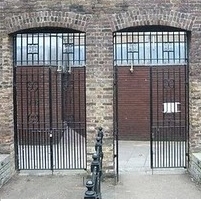Debtors’ Prisons Make a Comeback…in the U.S.
Friday, October 08, 2010

America’s jails are increasingly becoming de facto debtors’ prisons as the legal system levies more fees than ever on individuals who wind up behind bars simply because they can’t pay their bills or the administrative penalties imposed by judges. Both the Brennan Center for Justice and the American Civil Liberties Union (ACLU) have issued reports on the rise of debt-related incarceration, noting that courts are administering more fees these days as a way to make up for budget shortfalls.
The ACLU points out that throwing people in prison for not paying their financial obligations has been outlawed since 1983. “Incarcerating people simply because they cannot afford to pay their legal debts not only is unconstitutional but it has a devastating impact upon men and women, whose only crime is that they are poor,” states the ACLU. “The sad truth is that debtors’ prisons are flourishing today, more than two decades after the Supreme Court [in Bearden v. Georgia] prohibited imprisoning those who are too poor to pay their legal debts.”
Like the ACLU report, the Brennan Center’s investigation tells the stories of individuals who found themselves serving time because they had no money. One person in Pennsylvania wound up with three times more in fees than the amount of the original fines and restitution.
In many cases, the cost of keeping the arrested men and women in jail is far more than the fines themselves. In some cases they have been charged a booking fee and a daily fee for being imprisoned, which is turned over to a private collection agency for action. In Florida, private debt collectors are allowed to add a 40% surcharge to the amount sought by the state.
-Noel Brinkerhoff
In For a Penny: The Rise of America's New Debtors' Prisons (American Civil Liberties Union)
Criminal Justice Debt: A Barrier to Reentry (by Alicia Bannon, Mitali Nagrecha and Rebekah Diller, Brennan Center for Justice) (pdf)
Jailed for Debt in the U.S. in the 21st Century (by Noel Brinkerhoff, AllGov)
- Top Stories
- Unusual News
- Where is the Money Going?
- Controversies
- U.S. and the World
- Appointments and Resignations
- Latest News
- Trump Orders ICE and Border Patrol to Kill More Protestors
- Trump Renames National Football League National Trump League
- Trump to Stop Deportations If…
- Trump Denounces World Series
- What If China Invaded the United States?






Comments